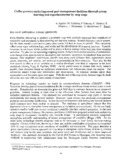Coffee growers make improved pest management decisions through group learning and experimentation by crop stage
Abstract
Farming families try to produce profitable crops with available resources, but they still face conditions of variability and uncertainty. Rainfall variability between 3 to 6 months affects crop vigor and phenology, pest levels, and crop practice efficiency. Farmers do not know which months will be below or above average when planning their crop, so when planning they have several sources of information such as experience, neighbors' experiences, expectations about prices, resources, climate and technical recommendations. For this reason, evaluations were carried out with participating farmers in 1997 and 1998, which showed that in the San Ramón cooperative, after 2 years of work, 4 of the original group of 6 farmers mentioned the sweeper as a problem pest. Farmers are more likely to communicate their results to other farmers, and farmers themselves proposed key skills they needed for better pest management: pest diagnosis, identification of factors that favor and disfavor crop susceptibility and pest increase, how to monitor pests and analyze numbers, experimentation and communication with other products.
Keywords
Publisher
Centro Agronómico Tropical de Investigación y Enseñanza (CATIE)
URI (Permanet link to cite or share this item)
https://repositorio.catie.ac.cr/handle/11554/10273Collections
- Publicaciones y documentos [4421]


